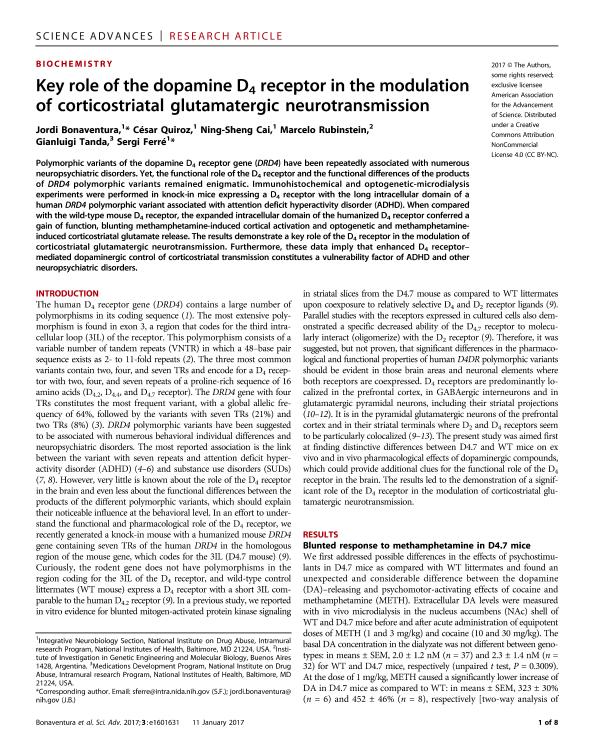Artículo
Key role of the dopamine D 4 receptor in the modulation of corticostriatal glutamatergic neurotransmission
Bonaventura, Jordi; Quiroz, César; Cai, Ning Sheng; Rubinstein, Marcelo ; Tanda, Gianluigi; Ferrer Gonzalez, César Sergio
; Tanda, Gianluigi; Ferrer Gonzalez, César Sergio
 ; Tanda, Gianluigi; Ferrer Gonzalez, César Sergio
; Tanda, Gianluigi; Ferrer Gonzalez, César Sergio
Fecha de publicación:
01/2017
Editorial:
American Association for the Advancement of Science
Revista:
Science Advances
ISSN:
2375-2548
Idioma:
Inglés
Tipo de recurso:
Artículo publicado
Clasificación temática:
Resumen
Polymorphic variants of the dopamine D4 receptor gene (DRD4) have been repeatedly associated with numerous neuropsychiatric disorders. Yet, the functional role of the D4 receptor and the functional differences of the products of DRD4 polymorphic variants remained enigmatic. Immunohistochemical and optogenetic-microdialysis experiments were performed in knock-in mice expressing a D4 receptor with the long intracellular domain of a human DRD4 polymorphic variant associated with attention deficit hyperactivity disorder (ADHD). When compared with the wild-type mouse D4 receptor, the expanded intracellular domain of the humanized D4 receptor conferred a gain of function, blunting methamphetamine-induced cortical activation and optogenetic and methamphetamine-induced corticostriatal glutamate release. The results demonstrate a key role of the D4 receptor in the modulation of corticostriatal glutamatergic neurotransmission. Furthermore, these data imply that enhanced D4 receptor-mediated dopaminergic control of corticostriatal transmission constitutes a vulnerability factor of ADHD and other
Palabras clave:
Dopamina
,
Drd4
Archivos asociados
Licencia
Identificadores
Colecciones
Articulos(INGEBI)
Articulos de INST.DE INVEST.EN ING.GENETICA Y BIOL.MOLECULAR "DR. HECTOR N TORRES"
Articulos de INST.DE INVEST.EN ING.GENETICA Y BIOL.MOLECULAR "DR. HECTOR N TORRES"
Citación
Bonaventura, Jordi; Quiroz, César; Cai, Ning Sheng; Rubinstein, Marcelo; Tanda, Gianluigi; et al.; Key role of the dopamine D 4 receptor in the modulation of corticostriatal glutamatergic neurotransmission; American Association for the Advancement of Science; Science Advances; 3; 1; 1-2017; 1-8; e1601631
Compartir
Altmétricas



